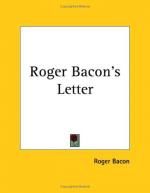|
This section contains 3,835 words (approx. 13 pages at 300 words per page) |

|
SOURCE: "The Father of Empiricism: Roger Not Francis," in Vivarium, Vol XII, No. 1, May, 1974, pp. 52-62.
In the following essay, Kupfer examines Bacon's credentials as the true father of empiricism for awarding "utility, observation, and 'experience' the central place in his philosophy of science and knowledge. '
Although Roger Bacon's life spanned most of the Thirteenth century, his philosophy of science carried his thought into what has been loosely dubbed the "Modern period". And although often credited with heralding this Modern period of philosophy Francis Bacon's emphasis on experiment is itself anticipated by his cousin's empiricism. Living three centuries earlier than his more celebrated scion, Roger Bacon's view of the scientific method is more fittingly regarded as the harbinger of the empirical tradition. Anticipating the Renaissance and Enlightenment interest in the melioration of the human condition Bacon awards utility, observation, and "experience" the central place in his philosophy...
|
This section contains 3,835 words (approx. 13 pages at 300 words per page) |

|


